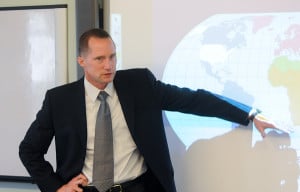“Diplomacy is difficult because you do not always achieve what you want and there is constant tension on how to protect your own interests while working with the interests of the other country,” said Mark Cassayre, a career U.S. diplomat and a current national security affairs fellow at the Hoover Institution, speaking at the Haas Center on Wednesday afternoon.
Cassayre’s talk was titled, “National Security: Cooperation between Diplomats and the Military.” In addition to addressing the relationship between the U.S. Department of State and the military, he branched out to discuss general policy issues and practical aspects of a foreign service career.
Prior to arriving at Stanford, Cassayre worked for the State Department in Kenya, Ukraine, Namibia, and Switzerland. Most recently, he served as the political counselor to the U.S. Mission to the United Nations in Geneva, which required working with agencies such as the U.N. Human Rights Council, the World Health Organization and the International Labor Organization.

Cassayre began his talk by giving a background of the State Department, including its history and organizational structure, before delving into how and why he became involved.
“I grew up in Napa, California and did not have a lot of exposure to diplomats and international affairs,” he said. “But I always had an interest in languages and studying abroad.”
Cassayre then listed and explained the responsibilities of a state official, which he said include protecting U.S citizens abroad and promoting U.S interests in areas such as trade and democracy.
Shifting the focus of the talk to the relationship between the State Department and the military, he pointed out that there are 100 defense personnel for every State Department employee.
“People talk about diplomacy being our first line of defense,” he joked. “Well, it is obviously not a very thick or deep line.”
Even though Cassayre stated “we [the State Department and the military] coordinate closely on a day to day basis,” he highlighted the key challenge of the different ways in which both institutions divide world regions for operations.
Additionally, he noted that both groups “do have very different cultures, backgrounds and training methods.”
Despite these obstacles, Cassayre said, “The overarching theme of my experience is that there is a need for military and state to work together.” He cited Afghanistan and Pakistan as examples of places where “it is essential we work hand in glove for programs to be effective on the ground.”
“Some projects cannot achieve their objectives without coordination with the military,” he said, citing his work in the Ukraine destroying old armaments as an example of essential collaboration.
“We try our best to make this an inter-agency process to make sure all entities are represented and at the table in order to organize a good policy approach,” he added.
Cassayre spent the second half of the event in an open discussion with participants. One audience member posed a question on the balance between private beliefs and diplomatic instruction.
“Frankly I have not had an issue of defending a policy that I disagree with,” Cassayre said. “Until you are very senior, you don’t have to defend a wide range of issues but rather focus on a set of issues that you are an expert in. They usually aren’t very controversial.”
“Within the organization, you have a voice and ways to share your opinions,” he added.
Cassayre also discussed the role of human rights in diplomacy, and the corresponding ability of diplomacy to raise awareness of human rights violations.
“Human rights being on the agenda has never been a question and will not go away,” he said. “But sometimes it is challenging because we have to do what is most effective for our overall range of interests.”
Audience questions also covered more practical aspects of working for the State Department, including learning new languages and specializing in geographic regions.
“New policies encourage officers to have experience in two regions so they are not diffused too much and have a better understanding of those regions,” Cassayre said. “But signing up for worldwide availability is part of the adventure of the job.”
The event was sponsored by the Stanford Military Service Network.